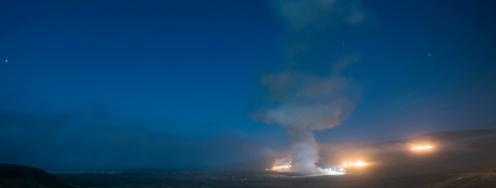What to Expect from North Korea’s Test
On the radar: Fuels, types, and repercussions; Date set for talks; Nukes in SOTU; Doomsday trains; Ahmadinejad’s last ditch; and Inter-city missile defenses.
On the radar: Fuels, types, and repercussions; Date set for talks; Nukes in SOTU; Doomsday trains; Ahmadinejad’s last ditch; and Inter-city missile defenses.
February 5, 2013 | Edited by Benjamin Loehrke and Alyssa Demus
Testing - North Korea is expected to conduct a nuclear test soon. Sig Hecker previews “Why, what, how will we know, when, and what difference will it make?” at Foreign Policy.
--Why test? Previous tests showed North Korea can build nuclear devices, but now it likely wants another test to validate designs of a miniaturized warhead that could be delivered by ballistic missile.
--What might the they test? Most likely a device using highly enriched uranium (HEU), says Hecker. North Korea has a limited plutonium stockpile and may instead opt to build a smaller warhead using its growing HEU stockpile. North Korea could also chose to simultaneously test two devices - one HEU and one plutonium. This could help validate two designs, complicate post-test intelligence gathering, and incur relatively less political cost for two tests.
--While “one more test does not fundamentally change the security threat North Korea poses,” writes Hecker, it could destabilize the region, frustrate the North’s relation with China, and make denuclearization talks even more difficult. Full analysis here. http://atfp.co/11PrmqA
It’s a date - Iranian and EU officials confirmed that Iran and world powers will meet in Kazakhstan on February 26. Confirmation of the talks has elicited mixed signals from Iranian officials. Yeganeh Torbati of Reuters has the story. http://owl.li/hra65
New talks, same demands - Iran and world powers may have announced a new round of negotiations, but there is little new when it comes to each side’s demands and expectations.
--For the next round of talks to succeed, ”both sides need to move with greater urgency and flexibility toward a lasting solution,” says Daryl Kimball, executive director of the Arms Control Association. Full story here. http://owl.li/hrf08
Welcome to Early Warning - Subscribe to our morning email or follow us on twitter.
--Have a tip or feedback for the editor? Email earlywarning@ploughshares.org earlywarning@ploughshares.org. Want to support this work? Click here.
Tweet - @Cirincione: Little noticed, but very important. VP Biden says Obama in SOTU will be "advancing a comprehensive nuclear agenda." http://bit.ly/Y7Pdj2
You thought the red line was a destructive force - The Air Force is considering proposals for replacing its silo-based ICBMs - including an option for moving the missiles around on a network of unmanned, underground trains. Other options include basing the ICBMs on off-road vehicles or just refurbishing the existing missiles. Sharon Weinberger at BBC News has the story.
--Such ideas have come around before. ”At the end of the day, all these options were way too expensive and they ended up in silos...You can come up with fancy ideas, but the reality check at the end of the day is: what is needed, what is necessary, and how much can we afford?” said Hans Kristensen. http://bit.ly/11njbYa
Tweet - @jfleck: So as I understand this, the challenging new science goal of Livermore's NIF is to figure out why NIF doesn't work? http://t.co/ytaRgTk5
Lame, destructive duck - Mahmoud Ahmadinejad’s days as Iran’s president are numbered, but he is using his last days in office to challenge his political rivals, appeal for popular or international support, and generally frustrate Supreme Leader Ali Khamenei. The controversies Ahmadinejad is drumming up are becoming a threat to the Iranian regime, writes Mohammad Ayatollahi Tabaar at The Mideast Channel. http://atfp.co/TFgPza
Award - “President Obama presents National Medal of Science to Sidney Drell.” Report and photo from the Hoover Institution. http://bit.ly/VBvkAG
Tweet - @IISS_org: Did Iran fake space monkey launch? No outside corroboration at all, IISS’s Mike Elleman warns @TheSunNewspaper. http://t.co/pToR1tmH
Events:
--”Dealing with a Nuclear Iran: Redlines and Deadlines.” Gen. James Cartwright, Former Vice Chairman of the Joint Chiefs of Staff, and seven other speakers. February 6, 8:30 a.m.-12:30 p.m. @ CSIS. http://owl.li/hbQKm
--”What to do about Nuclear Outliers Iran and North Korea?” Robert Litwak, Vice President for Scholars and Academic Relations and Director of Int. Security Studies, Woodrow Wilson International Center for Scholars. February 6, 12:00-1:30 p.m. @ George Washington University. http://owl.li/hbTo6
--”Year of Decision: U.S. Policy toward Iran in 2013.” Thomas Pickering and James F. Jeffrey. February 7, 12:30p.m. @ The Washington Institute for Near East Policy. Details and RSVP here. http://owl.li/hp2Nx
--”Evolving Global Security Challenges: From Traditional to Nontraditional Security Challenges.” Joe Cirincione, President of Ploughshares Fund. February 13, 6:00-8:00 p.m. @ Monterey Institute of International Studies. Live stream here.http://owl.li/hrbm7
--”Five Myths About Nuclear Weapons: A Pragmatic Re-appraisal.” Ward Wilson, Senior Fellow at the Center for Nonproliferation Studies, Monterey Institute. February 14, 3:30-5:00 p.m. @ American University, School of International Service. http://owl.li/hkKOD
--”The Korean Peninsula Issues.” Institute for Corean-American Studies. February 15, 1:00-4:30 p.m. @ Rayburn Office Building, Room B.http://owl.li/hr2Ag
Dessert:
Tweet - @nxthompson: Product Placement: Kim Jong-un uses an HTC phone. http://t.co/Zy3If1H5
Bombs over Lexington - Impressed by presentations of the Iron Dome on a recent trip to Israel, Sen. Rand Paul (R-KY) told reporters afterwards that he saw “no reason” why “major [U.S.] cities” shouldn’t be protected by a similar missile defense system. Usha Sahay of Nukes of Hazard discusses Rand’s comments and whether Lexington really needs to be worried about short-range missiles from Kansas City. http://owl.li/hri4g



